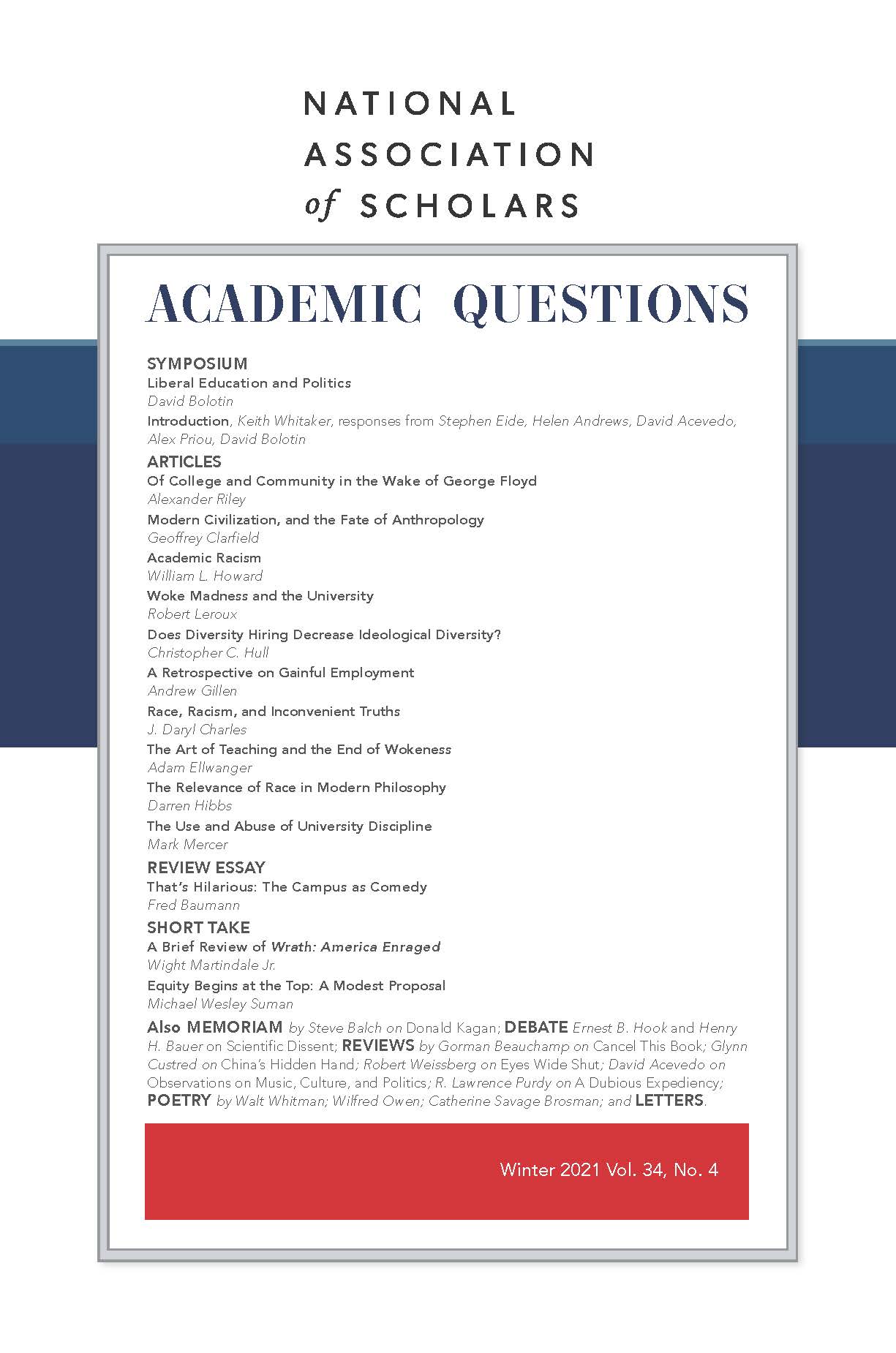SYMPOSIUM: Liberal Education and Politics
David Bolotin, St. John’s College
In provocative and discerning remarks made in December 2020 at St. John’s College, tutor emeritus David Bolotin claims that higher education’s relationship to the “political community” is currently the greatest obstacle to liberal education. “Political correctness,” says Bolotin, with its power to enforce consequences on those who challenge its orthodoxies, has prevented the serious study of the West’s “Great Books,” and suppressed the reasoned examination of society’s deepest moral convictions.
National Association of Scholars Board Chairman Keith Whitaker introduces Bolotin’s remarks, followed by responses from young critics not long removed from their own experience as college students: Stephen Eide, Helen Andrews, David Acevedo, and Alex Priou.
Of College and Community in the Wake of George Floyd
Alexander Riley, Bucknell University
In the wake of the conviction of police officer Derek Chauvin for the murder of George Floyd, Bucknell University, like other schools across the country, called upon the campus “community” to come together in support of expansive “anti-racism” programs. Sociologist Alexander Riley questions whether the establishment of a woke social justice regime is sufficient for a shared notion of community, and delineates the likely consequences if it is not.
Modern Civilization, and the Fate of Anthropology
Geoffrey Clarfield
Anthropologist Geoffrey Clarfield remembers his relief when he encountered the work of Christopher Hallpike, an anthropologist who challenged the suffocating scholarly consensus that “people are the same everywhere” and “that all cultures are somehow equally valid, and that by implication, they are all equally complex.” Clarfield sits down with Hallpike to discuss the latter’s contention “that there is a fundamental difference between primitive peoples and moderns,” and that comparatively there is much to admire about the West and modernity.
Academic Racism
William L. Howard, Chicago State University
The racism we see in America today, the kind that operates under the guise of “anti-racism,” obsesses over “white supremacy,” teaches from the “1619 Project,” and culminates in riots, destruction, injuries, and death, was “concocted in the laboratory of leftist ideologies: American universities.”
Woke Madness and the University
Robert Leroux, University of Ottawa
Sociologist Robert Leroux traces woke ideology from its beginnings to its takeover of the university, from where it emerged.
Does Diversity Hiring Decrease Ideological Diversity?
Christopher C. Hull
Christopher C. Hull asks if diversity-driven hiring is the cause of declining viewpoint diversity in higher education. His study, which examines language in faculty job postings, presents evidence that this may be so.
Race, Racism, and Inconvenient Truths
J. Daryl Charles, Acton Institute Affiliated Scholar
The United Nations-sponsored Human Rights Council recently published the results of its year-long study on “racial discrimination.” Focused primarily on the United States, the report delivers a torrent of social justice jargon to indict the U.S. system as critically flawed, omitting any consideration of America’s noble civil rights revolution or the vast array of non-discriminatory factors contributing to the black condition in the United States.
The Art of Teaching and the End of Wokeness
Adam Ellwanger, University of Houston-Downtown
Adam Ellwanger believes that the left conquered K-12 education by focusing on teaching technique and style, while traditionalists obsessed over curriculum content. The substance of what is taught in our schools is important, but instituting change in America’s public school can only happen by first restoring traditional teaching methods and administrative procedures.
The Use and Abuse of University Discipline
Mark Mercer, Saint Mary’s University, Halifax, Nova Scotia
Mark Mercer argues that the only proper goal a university could have in seeking to discipline a professor is to put an end to that professor’s bad behavior. Discipline, Mercer insists, should not be used to right a wrong, “correct” anyone’s thinking, mollify an aggrieved party, signal the university’s “care and concern,” or to deter others.
REVIEW ESSAY
That’s Hilarious: The Campus as Comedy
Fred Baumann, Kenyon College
Can something as serious as the assault on liberal education be played for laughs? Political scientist Fred Baumann finds that Scott Johnston’s Campusland and Andrew Pessin’s Nevergreen take different approaches to the campus gloom, with disparate results.
SHORT TAKES
Wrath: A Brief Review
Wight Martindale Jr.
Wight Martindale finds that Peter Wood’s new book Wrath: America Enraged is as much about patience as passionate indignation.
Equity Begins at the Top: A Modest Proposal
Michael Wesley Suman, University of California at Los Angeles
Those in our universities who want to level our corrupt meritocracy should be first to hand over their meritoriously padded fiefdoms.
MEMORIAM
Donald Kagan: A Citizen Scholar
Steve Balch, Founding President, National Association of Scholars
Steve Balch remembers Donald Kagan, a scholar and academic leader, and one of higher education’s most noble citizens.
DEBATE
Scientific Dissent: The Fate of Premature Claims
Ernest B. Hook, University of California at Berkeley
A Reply to Ernest Hook
Henry H. Bauer, Virginia Polytechnic Institute & State University
Public health professor emeritus Ernest Hook takes issue with Henry Bauer’s provocative article in the summer 2021 issue “Fact Checking Is Needed in Science Also,” in which Bauer argues that the stifling of dissent has impeded scientific advance. Afterward, Bauer responds to Hook.












